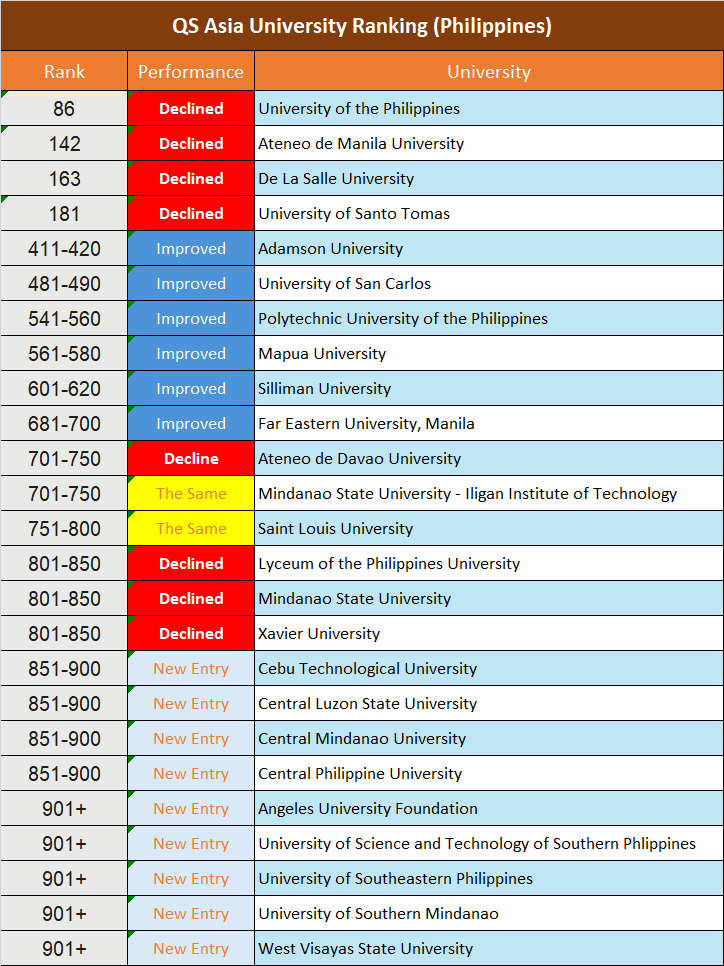The Essential Role of Research in Achieving QS Asia University Ranking Success: An Urgent Call to Action for Philippine Universities
For a university to achieve top ranks in the QS Asia University Rankings, it must embrace one essential truth: research and innovation are not just components—they are the core drivers. Research not only directly influences indicators such as output and citations but also underpins areas like academic and employer reputation, faculty-to-student ratios, and internationalization. To truly ascend in the global academic arena, universities must be governed by visionary, research-focused leadership. Without this commitment, the institution’s journey toward ranking among the world’s best will remain an elusive dream.
The reality facing Philippine universities is sobering. In 2025, the top universities in the Philippines dropped several ranks compared to their 2024 standings. Despite efforts to improve, it appears that Philippine universities are falling behind as other countries in Asia quickly overtake them in quality, innovation, and reputation. This trend signals a crucial gap: while Philippine universities may be making strides, these efforts are not enough, and the Philippines might not be implementing the right strategies for global success.

Research and Innovation: The Heartbeat of QS Rankings
In the QS Asia University Rankings, research and innovation account for an estimated 55%–65% of the overall score, both directly and indirectly. Here’s how:
Direct Impact through Research Output and Citations (20%):
- Universities are measured by the productivity and impact of their research, as evidenced by Scopus-indexed publications. A strong research culture propels high output, but it also demands quality; citations per faculty reflect whether an institution’s research resonates within the global academic community.
Indirect Influence on Academic and Employer Reputation (50%):
- Academic and employer reputation metrics are profoundly affected by a university’s research contributions. Academics look for institutions that are thought leaders, and employers seek graduates with the advanced skills fostered by research-driven learning. A university without a research focus struggles to attract esteem from these stakeholders, as it lacks the academic rigor and innovation critical to maintaining global relevance.
Faculty-to-Student Ratio and Internationalization (10%):
- Research-active universities tend to attract both international talent and funding to support a favorable faculty-to-student ratio, which enhances the academic experience. Likewise, global research partnerships bring international students and faculty, boosting an institution’s global profile and facilitating exchange programs.
Governance Matters: The Right Leaders to Drive Research Excellence
To be a world-ranked university, leadership must be deeply invested in research. The board, president, vice presidents, deans, and directors should not just accept but embrace a research-driven culture. This is not merely about ticking boxes—it’s about fundamentally shifting the institution’s focus to prioritize research excellence as the path to academic distinction.
As Goodall points out in her study, “Is Socrates in the Boardroom of Higher Education Institutions?”, a university governed by managers rather than scholars will inevitably lag in rankings. Governance by leaders who lack a research background—or worse, who are indifferent to it—creates a system bogged down by administrative inertia rather than academic progress. When universities are led by academics who truly understand and value research, decisions around funding, staffing, and program development are made with a strategic focus on fostering a robust research environment.
The Philippine Conundrum: Prioritizing Administrators over Scholars
The governance structure in many Philippine universities, unfortunately, remains focused on administrative efficiency rather than research excellence. In the Philippines, the selection of university presidents, board members, and deans tends to prioritize administrative skills over scholarly acumen. This approach is fundamentally misaligned with the demands of global university rankings, which reward research impact and academic influence far more than administrative competence.
For Philippine universities to make meaningful strides in rankings, a paradigm shift is urgently needed. Academic leaders—those with deep research experience—should be at the helm, making strategic decisions that prioritize research output, innovative initiatives, and international collaboration. Without leaders who are scholars at heart, institutions risk becoming disconnected from the very foundation of academic excellence.
The Power of a Research-Driven Culture
Achieving a strong position in QS rankings requires more than ambition; it demands a wholehearted embrace of research from every level of governance. Here’s what needs to change:
Empower Scholars in Governance: University boards should prioritize appointing presidents, vice presidents, and deans who have a record of research excellence and are committed to driving a research-first agenda. Decisions affecting resource allocation, faculty hiring, and international partnerships should be made by leaders who value research as the institution’s core mission.
Allocate Resources to Research: Funding should be directed not only toward administrative needs but into grants, labs, and faculty development programs that empower researchers. A research-first approach requires sustained investment, not just in infrastructure but in nurturing talent, from early-career researchers to experienced faculty.
Embrace Global Standards: Universities aiming for high QS rankings must look beyond national boundaries and embrace global standards in research, faculty quality, and student engagement. Partnering with top international universities, fostering faculty exchange programs, and participating in joint research projects are all essential steps to bolster global reputation.
A Call to Action: Reimagine University Leadership in the Philippines
If Philippine universities are to break free from the middle rankings and truly compete on the world stage, a fundamental shift in governance is imperative. The path forward is clear but challenging. The university’s leadership must commit to elevating research from a mere function to the heart of its identity.
Universities governed by administrative managers rather than scholars will continue to struggle. The future demands leaders who can make bold, research-focused decisions, even if it means confronting bureaucratic resistance. Achieving a strong QS ranking isn’t about excelling in administration—it’s about excellence in research. The time has come for Philippine universities to embrace a research-driven culture and for leaders to prioritize the intellectual mission over managerial tasks. Only then can the nation’s universities truly stand among the world’s best.
For the Philippines, the solution lies in redefining what it means to lead an academic institution. The recent drop in QS rankings of top Philippine universities is a wake-up call that current efforts are insufficient. While the global landscape races forward, Philippine universities cannot afford to be left behind. Only by placing research at the core of decision-making can universities in the Philippines hope to climb the QS rankings and build a legacy of academic excellence that matches their potential.
